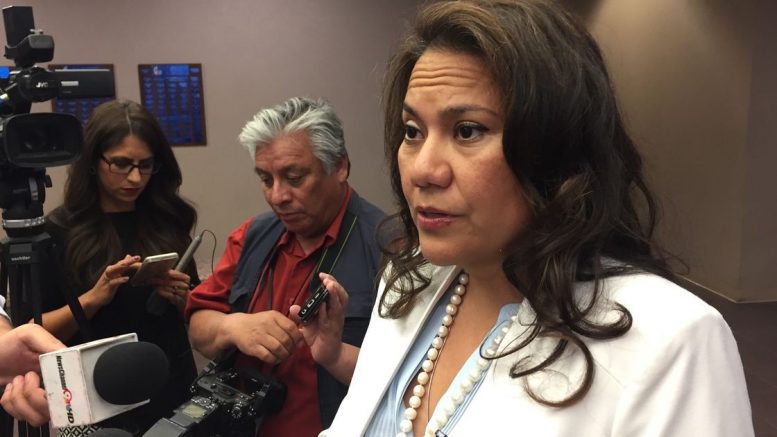A day after Texas Gov. Greg Abbott signed the controversial anti-sanctuary law, El Paso County Commissioners Court met in closed session to discuss possibly challenging the law in court.
County Judge Veronica Escobar declined to provide details on the discussion, but did not rule out a possible lawsuit challenging the law that allows local police officers and sheriff deputies to question people on their immigration status. The law also imposes penalties of up to $25,000 per day and it can lead to jail time and removal from office for any official who refuses to comply with the ban on sanctuary cities. It goes into effect on Sept. 1.
“What you’re going to see, not just from El Paso County, but probably from many Texas jurisdictions, is a legal challenge to the law,” Escobar said. “I can’t speak about the particulars yet. I’m hoping that we would have more details to share with the public soon.”
On Monday, Texas Attorney General Ken Paxton filed a federal preemptive lawsuit in an attempt stop pro-immigrant rights groups and local officials from challenging the law.
Thomas Saenz, president of the Mexican Legal Defense and Education Fund, said the lawsuit is “a frivolous legal action, filed precipitously and without basis in the law.”
Escobar said she believes the county needs to take legal action because the so-called “show me your papers” law threatens El Paso’s public safety by eliminating community policing.
Under the new law, local police officers become “de facto border patrol agents” causing people, especially those who are either undocumented or have undocumented relatives in their family, not to report crimes or engage with local law enforcement, she said.
Protestors gathered outside the Blackstoe Event Center where Governor Greg Abbott was to speak Saturday. (Photo: Victor Calzada/El Paso Times)
“We need to do what we can to defend what is kind of the center piece of pride for El Paso and the one fact that we consistently used when we beat back against anti-border rhetoric and that’s our safety,” she said.
During the signing of the bill via Facebook on Sunday, Abott said the sanctuary cities law will keep communities safe by preventing cases like Kate Steinle’s murder in San Francisco from occurring in Texas. Steinle was shot and killed by an undocumented immigrant who had been deported to Mexico several times.
He said the new law ensures that local law enforcement will cooperate with U.S. Immigration and Customs Enforcement and requires sheriff’s departments to honor ICE detainer requests. Abbott said elected officials and law enforcement agencies don’t get to pick and choose which laws to obey.
“We all support legal immigration. It helped build America and Texas. Texas strongly supports the legal immigration that has been a part of our state from our very beginning. But legal immigration is different from harboring people who have committed dangerous crimes,” he said.
El Paso County officials have argued that Senate Bill 4 would violate a 2006 federal court settlement in which the county agreed to bar sheriff’s deputies from enforcing immigration law. That came after complaints that deputies were conducting checkpoints, including stopping a public bus, in an attempt to snare undocumented immigrants.
Carl Starr, the plaintiff in the suit against El Paso County, has said he would sue again if sheriff’s deputies begin asking detainees about their immigration status.
El Paso County Sheriff Richard Wiles was not available for comment Monday. He has said the law was not necessary and it would represent a burden on his deputies.
The Border Network for Human Rights, a pro-immigrant non-profit in El Paso, called on current and future county and city leaders to fight against the law.
Bishop Mark J. Seitz reacts to the Texas House of Representatives vote and talk about what’s next.
Victor Calzada/El Paso Times
“We cannot wait for this bill to become law in September to begin resisting the harm it will cause,” the organization said in a statement. “You must lead the opposition on behalf of your constituents and our values of inclusion and welcoming, and you should know that your courage can draw on the support of the public.”
City leaders have remained mostly quiet on the issue and have not addressed how the new law might impact policing. City officials have repeatedly said they would wait until the bill passed to comment. They couldn’t be reached for comment on Monday.
El Paso Police Chief Greg Allen during a Central Business Association meeting in February said the police department is not interested in enforcing federal laws, but has otherwise not commented on the issue. On several occasions, city spokespeople have said Allen was unavailable for comment.
Mayoral candidates Dee Margo and David Saucedo, who will face each other in a June 10 runoff election, said they would rely on the police chief’s judgment on the matter.
Texas Governor Greg Abbott signed a so-called “sanctuary cities” ban that lets police ask during routine stops whether someone is in the U.S. legally. Opponents protested outside of the Governor’s mansion on Sunday evening. (May 8)
AP
“I don’t think it’s the job of the El Paso police to enforce immigration,” Margo said, adding that he supports the police chief’s stance that there are not enough officers or resources to enforce immigration laws.
Margo, a businessman and former state representative, said he does not think the bill will have much of an impact on El Paso.
“Right now we are not in violation,” Margo said. “If somebody showed me that we are going to be harmed by this bill in some fashion, then we will take action.”
Saucedo, a businessman, echoed the stance.
“Our police department is not in a position to enforce this,” Saucedo said. “I yield to Chief (Greg) Allen’s expertise on this matter.”
Saucedo also said the community will have to firmly advocate against the law, adding that he’s concerned the law will make the community less safe and force undocumented immigrants into the shadows.
The Migration Policy Institute, citing 2010-14 data, estimates that some 66,000 undocumented immigrants live in El Paso County, while some 1.5 million unauthorized immigrants live in Texas.
Aileen B. Flores may be reached at 546-6362. [email protected]. @AileenBFlores on Twitter.
El Paso Times Reporter Elida Perez contributed to this report.
Source: www.elpasotimes.com





Be the first to comment on "County Mum on Proposed Sanctuary Cities Lawsuit"